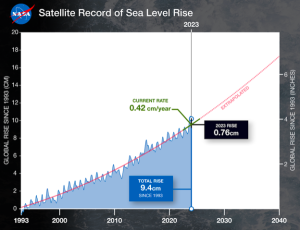Sea levels are rising faster than expected in South Florida, according to the National Oceanic and Atmospheric Administration.
Actually, they’re rising all around the world, but South Florida is of particular interest. If the pace of the rise stays as now projected, the sea level in Miami could increase by two feet by 2070. That’s a major concern because the average elevation in Miami is just three feet.
In the past 80 years, the sea level has risen about a foot, but the pace of the rise has picked up in recent years. Indeed, eight inches of that foot have come in the past 30 years. And NOAA says the rise will increase faster in the future. The next foot will take just 30 years (not 80); the foot after that, just 20 years; the one after that, just ten years.
NOAA has adopted a series of projections to estimate what the rise will look like in the future. They are Low, Intermediate-Low, Intermediate, Intermediate-High, and High. The projections are now tracking in the Intermediate-High and High categories, the two fastest.

Global sea level rise since 1993 in blue, measured by five satellites. Red line projects future rise. NASA
The main factors causing the rise are increasing ocean temperatures and melting ice sheets in Greenland and Antarctica. Hotter water takes up more space than cooler water, so hotter oceans mean higher sea levels. The hotter atmosphere caused by global warming means that the ice sheets are melting faster, adding to the amount of water flowing into the ocean.
“The oceans are running hot and they’re running high,” said Dr. William Sweet, a NOAA oceanographer, particularly in the Southern Atlantic and the Gulf of Mexico. “We’re on track for a rise of upwards to a foot or so in the next 30 years in areas of South Florida,” he said.
A weakening Gulf Stream could make matters worse. When the Florida Current is weaker, sea levels rise in South Florida. Recent research shows that it may be slowing down now.
and see the video here https://www.youtube.com/watch?v=dc4lRKIRl84




